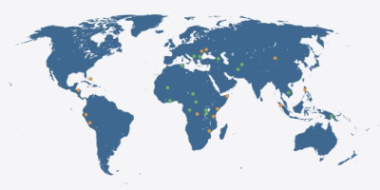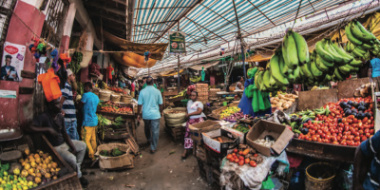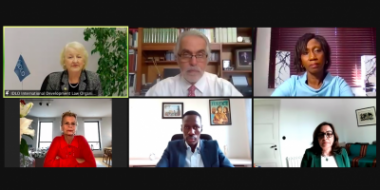Legal Reform

To reform laws is to reform societies. At IDLO, this is something that we have had thirty years to learn. And there are no more important laws than fundamental laws – national Constitutions. One of greatest, the Constitution of the United States of America, has served that nation well for nearly a quarter of a millennium. Constitutions encapsulate a vision. In countries struggling to overcome trauma, as is the case of Kenya; struggling to be reborn, as in Somalia; or struggling to be born at all, as in South Sudan, Constitutions respond to a collective need for unity and renewal.
But Constitutions are also highly technical documents. They set the parameters for law and justice in a given jurisdiction. For this reason, they require legal resources and expertise unavailable in many developing nations. By providing those resources and expertise, IDLO is proud to have assisted several countries through complex constitutional processes.
Justice Albie Sachs: The Rule of Law is a Way of Life
In an address to IDLO staff in Rome, Albie Sachs, formerly of the Constitutional Court of South Africa, shared memories from a lifetime spent defending freedom – first as an exiled member of the African National Congress (ANC)

South Sudan: Legal Skills for Civil Society
IDLO’s first legal course for representatives of civil society organizations (CSO), working to promote the rule of law, improve access to justice and support peace initiatives, has launched in South Sudan this week.

IDLO's Somalia Work Showcased in DC
IDLO Somalia Country Director Adam-Shirwa Jama told a Washington roundtable hosted by the United States Institute of Peace that reform of the justice system had begun in Somalia. While it would take time for justice institutions to reach the whole of the country, Mr. Jama said, IDLO was encouraged by the international support given to these nascent institutions.

Facilitating Peace and Reconciliation in Kyrgyzstan
Following the April 2010 Revolution in the Kyrgyz Republic, an interim government came to power promising to end many of the injustices that had prompted the overthrow of the country’s previous two presidents. Many reforms carried out during the interim period were focused on improving the foundation and application of the rule of law. Despite initial steps made towards progress in this area, the political events of 2010, including ethnic violence, significantly undermined potential progress in the rule of law.
Somalia: Constitutionalism, Rights, and Those Who Make Them Happen
by Christopher Kerkering

Afghanistan: Criminal Law in the Service of Women
Good laws are one thing; implementation is another. Texts and statutes are critical instruments in advancing the rule of law -- but their benefits are limited if those tasked with their application, let alone their intended beneficiaries, fail to understand them. Where a gap develops between the law and what the legal profession makes of it, abuse and injustice will thrive.

Myanmar: Suu Kyi Welcomes Rule of Law Course
As many as 80 lawyers, lecturers and civil society representatives have completed an IDLO-supported, three-month rule of law course in Myanmar -- to find their achievements commended by veteran pro-democracy activist and Nobel laureate Aung san Suu Kyi.

Biodiversity: A Legal Grounding in Benefit Sharing
This July as every late July, many Romans fled their city. In their place came hundreds of thousands of international visitors. For the overwhelming majority, the trip was about relaxation; for others, it was about studying and a sense of public mission.

Youth Day: No Development Without Youth Development
The United Nations marks International Youth Day today (August 12) – an opportunity to recognize youths’ contribution to enhancing their communities and global society. Half of the world population is under 25. Almost two-billion people are under 14, the overwhelming majority of whom live in the developing world.

Pages
Key Initiatives
-
 Justice within the context of commercial law is premised on the fact that an effective commercial justice system meets and facilitates the specialized needs of the business community and the private sector at large. However, there are persistent challenges related to the dispensation of commercial justice in Kenya.
Justice within the context of commercial law is premised on the fact that an effective commercial justice system meets and facilitates the specialized needs of the business community and the private sector at large. However, there are persistent challenges related to the dispensation of commercial justice in Kenya. -
 Indonesia has a high number of overlapping or contradictory laws and regulations. This results in ineffective administration, lengthy processes and obstacles for economic development. While the Government of Indonesia has taken certain measures to enhance regulatory reform, regulatory functions are currently scattered across several governmental institutions, creating a web of uncoordinated mandates. There is therefore a need for a central body or unit within the government that oversees regulations.
Indonesia has a high number of overlapping or contradictory laws and regulations. This results in ineffective administration, lengthy processes and obstacles for economic development. While the Government of Indonesia has taken certain measures to enhance regulatory reform, regulatory functions are currently scattered across several governmental institutions, creating a web of uncoordinated mandates. There is therefore a need for a central body or unit within the government that oversees regulations. -
Renforcement de la chaine pénale au nord du Mali. En 2016, l’IDLO a lancé un programme de cinq ans au Mali, financé par le Gouvernement des Pays-Bas : « Renforcement de la chaîne pénale au nord du Mali ».
-
An effective prosecution service is critical to the provision of justice, stability and peace in Somalia. But the absence of a robust, independent and competent prosecutorial service has contributed to a climate of impunity, increasing the proliferation of both low-level and serious crimes, including terrorism, corruption and gender-based violence throughout Somalia.
-
 Funding and spending patterns of the General Procuracy of the Kyrgyz Republic (GP) have remained relatively invariable since Kyrgyzstan became an independent state in 1991. Stagnant funding has had negative implications for the GP, and the Prosecutors’ Training Center (PTC) requires support to train and retrain prosecutors in accordance with changing Kyrgyz legislation and international human rights standards. Additionally, gender inequalities within the GP remain a significant challenge.
Funding and spending patterns of the General Procuracy of the Kyrgyz Republic (GP) have remained relatively invariable since Kyrgyzstan became an independent state in 1991. Stagnant funding has had negative implications for the GP, and the Prosecutors’ Training Center (PTC) requires support to train and retrain prosecutors in accordance with changing Kyrgyz legislation and international human rights standards. Additionally, gender inequalities within the GP remain a significant challenge.




